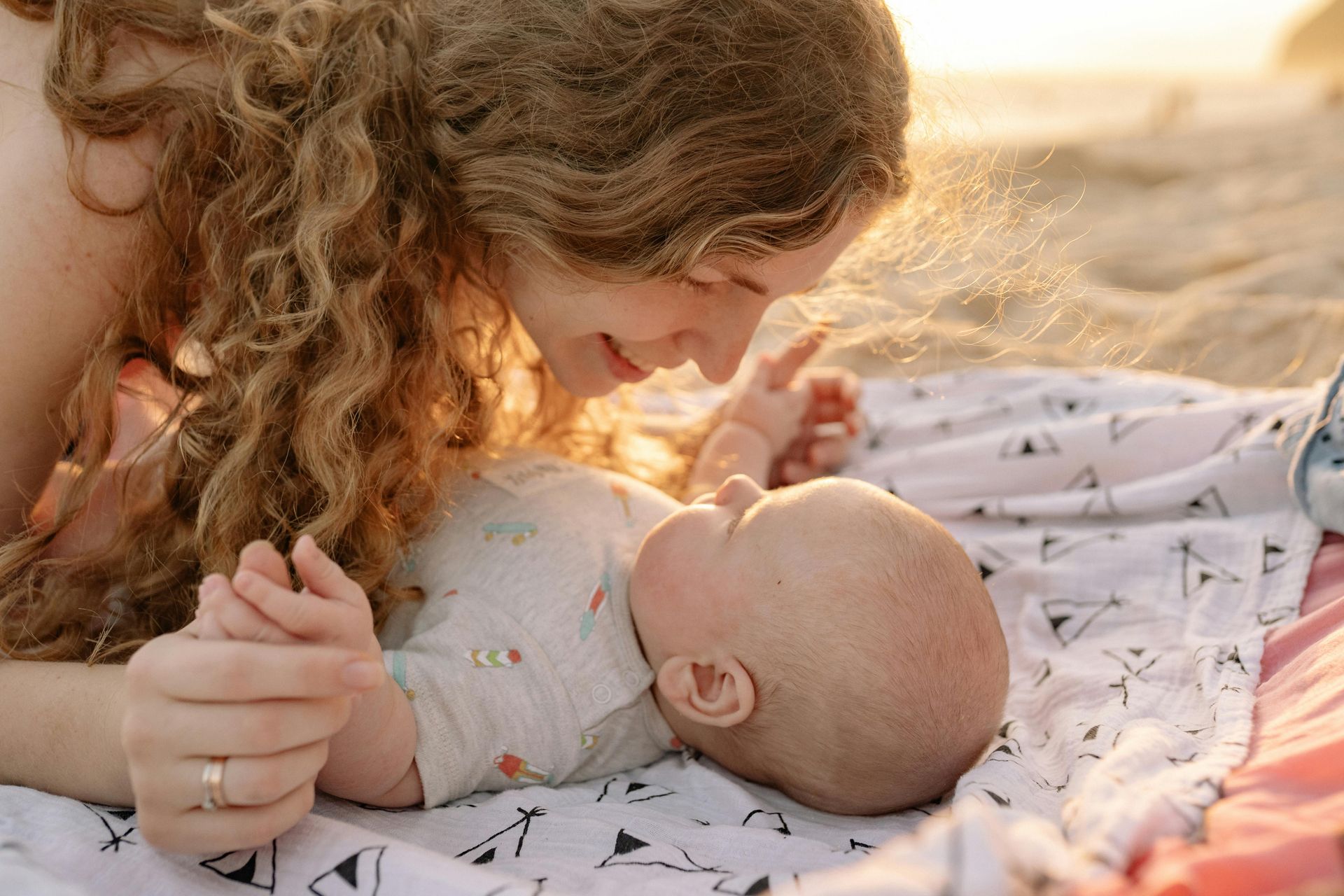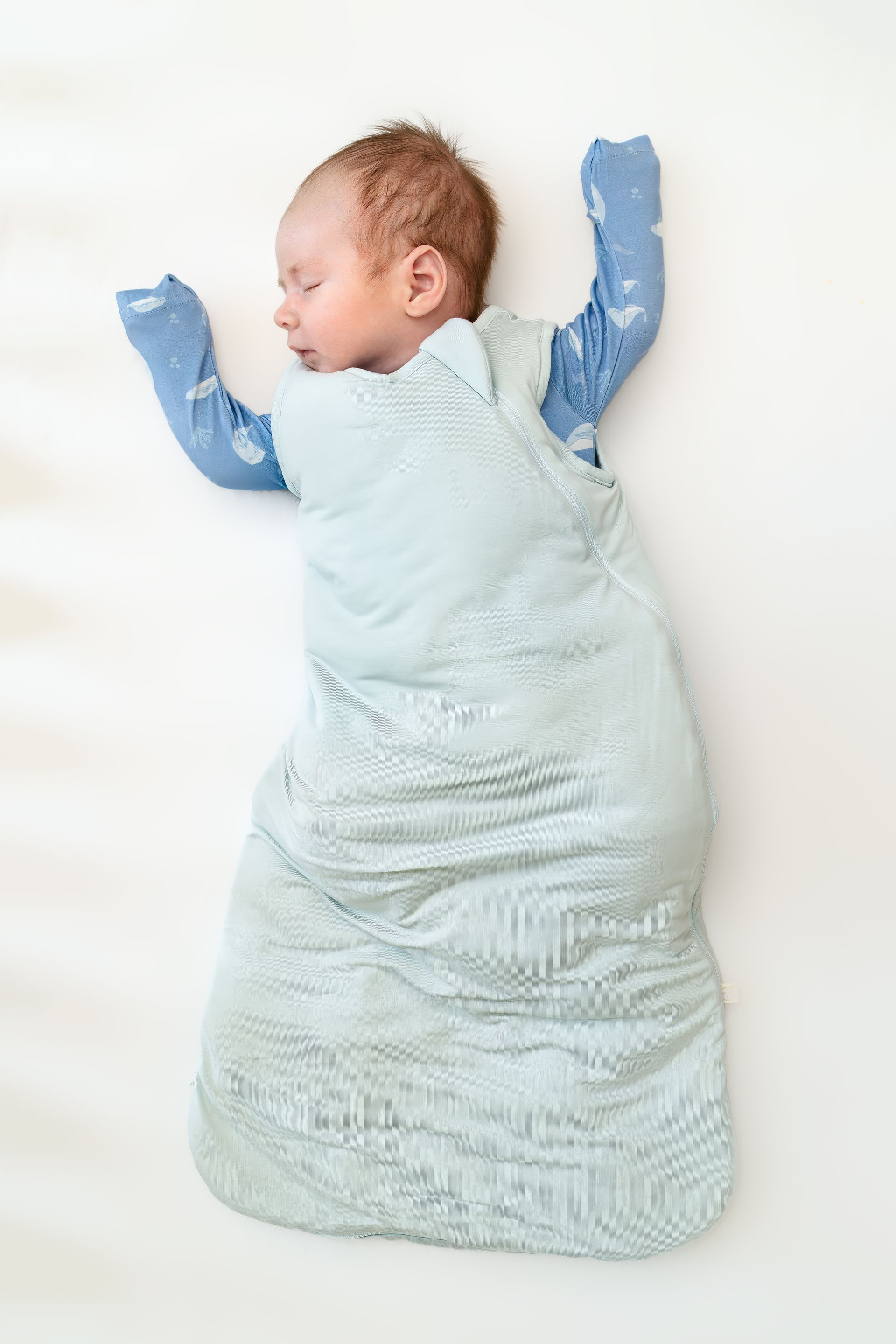When is the perfect time to move my baby from a crib to a bed?
lbenjell • February 17, 2022
The transition of a baby from sleeping in a crib/cot to an actual bed with no bars is quite the milestone. And why shouldn't it be? Afterall, it’s one of those clear signals that your baby is no longer a “baby”. But as excited as you are to see your baby grow, I urge you to take a beat before making this particular decision. And you will see why as you go through this.
My eldest’s crib had a removable side. And as soon as he climbed out of his crib once (ONCE) I took it to mean he was ready for that side to come down. Mind you he was just about 18 months old. And for the next year or so, he woke up every night walked over to our room and finished the night in our bed. Needless to say, neither I nor my husband slept well that year. We began to miss those nights we slept all night long uninterrupted as a result of the sleep training we had done in my son’s early months. We ended up fixing the situation by going back to basics and a whole lot of incentives. Did I learn from that mistake, you ask? Why YES. My youngest stayed in his crib until he went to college! I’m kidding but he stayed in a crib until he was old enough to ask for a big boy bed. And there were never any night visits to our room. And even after transitioning to single bed, he requested a crib every time we were in a new sleep environment for the next 6 months or so (think hotels and grandparents’ house).
Why am I telling you this story? Because crib climbing is not necessarily a sign that baby is ready to move to a toddler or big bed. Your baby attempting to climb out of their crib is simply their way of practicing a new skill that they have acquired. And it is a total teaching moment and an opportunity for you to show them where climbing is ok and where it is not. Read more about crib climbing in this post: https://www.one2sleep.com/climbing-out-of-the-crib
"It takes maturity and readiness for your
baby to be able to move to a bed with no bars"
It takes maturity and readiness for your baby to be able to move to a bed with no bars. That crib and those bars have provided your baby a safe and contained sleep environment for months, hopefully years. In fact, I recommend that your baby stays in their crib until they are as close to three years of age as possible (or later if possible). That’s because a baby under 3 years lacks the maturity and impulse control that will allow them to STAY in bed if they wake up at night. If your baby is too young, then the lack of bars will make it very difficult for them to stay in bed.
Is this rule absolute? Of course not. Just like anything when it comes to sleep, it is best to use your judgment. I have personally advocated to move a baby to a toddler bed earlier in one of two cases in the past:
- Your baby has reached the crib’s size limit: check your crib to see the height and weight limits recommended.
- Your baby continues to climb out of their crib: despite your best efforts to keep them in, and despite all the tricks and hacks, your baby continues to jump out of the crib making it unsafe for them as there is a high risk of injury.
Now that you know when, how do you actually move your baby to a bed after they have spent the last 3 years in the crib? How do you get them to accept the idea? Once again, preparation is key!
The bed: I say move straight to an actual single size bed. No need to buy a toddler bed only to have to buy a bigger bed in a couple of years. It just makes sense from a financial perspective. But I completely understand the lure of buying a car-shaped bed or the like for aesthetic reasons. Add a safety rail or bumper if you go for the big boy bed, just for the time they need to adjust to the lack of bars.
The room: Bolt all furniture to the wall and remove anything that can trip your babe should they get up at night and wander around. While I certainly hope you have done the prep work to help them stay in bed and that their sleep foundation is strong, we cannot discount that possibility.
The child: Help your child transition seamlessly by preparing them. Inform them of the upcoming change, involve them in setting up the room, choosing the bed and the new bedding. And help them understand that the sleep rules are still the same while carefully navigating not actually giving them the idea of getting out of bed at night. Meaning don't insert the idea in their head by saying something like: “Hey Adam, this is your new bed! you will sleep in it all night long and will not walk over to my room if you wake up at night!”
Sometimes, moving one child to a bed is not a choice but a necessity because we have another baby on the way that will need the crib. If this is the case, make sure you do it well before (at least 3 months) baby is born and that’s for a few reasons:
- So that your older child does not feel displaced by their younger sibling. This might create extra jealousy in an already precarious situation.
- So that you have the option to bring your child back to the crib should the transition not go as smoothly as expected.
** Bonus hack: As you begin to think about making this transition, introduce a toddler clock. Teach your child about when it is ok to wake up in the morning by using the clock while they are still in the crib. This will help you maintain the same rules once they are in the bed.

Choosing a car seat is one of the most important decisions you’ll make as a parent. It’s not just about convenience — it’s about giving your child the best protection on every journey . In the UAE, where we drive long distances, face busy roads, and deal with extreme heat, the right car seat matters more than ever. But with so many options, how do you know which one to choose? Here are our top 4 tips to make car seat shopping easier — and safer. 1. PRIORITIZE SEATS THAT UNDERGO THE TOUGHEST CRASH TESTING Not all car seats are created equal. Many parents think if a seat is “legal,” it must be safe — but that’s not always true. ECE R44 : The most basic standard, now phased out in Europe. ECE R129 (i-Size) : Stricter testing with better head, neck, and side-impact protection. The Swedish Plus Test : The toughest crash test in the world — and the gold standard. What makes the Swedish Plus Test so important? It’s the only test that measures neck forces on a child’s body in a crash. Seats that pass prove they can keep neck loads below dangerous limits — a key factor in preventing serious injury. Many car seats fail completely under this extreme test, which shows just how high the bar is. 👉 If a car seat has passed the Swedish Plus Test , you can be confident it offers the highest level of safety for your child. 💡 Remember: Legal does not always mean safe . Go beyond the minimum. 2. CONSIDER YOUR CHILD'S HEIGHT, WEIGHT, AND AGE — EVEN THE SMALLEST ONES Every child grows differently, and size matters when it comes to safety. Preemies and smaller babies : Standard carriers often don’t provide the right fit. They need extra support for the head, neck, and body, plus proper harness positioning. Twins or multiples : Planning seating for two (or more) at once requires careful choice so every child gets the safest setup. As children grow, their height and weight percentiles determine how long a seat will last. We recommend car seats with at least a 25kg weight limit and 125cm height limit , which allow for extended rear-facing travel . Why rear-facing ? Research shows it is up to 5 times safer than forward-facing for children up to 6–7 years old. Better crash force distribution across the strongest part of the body. Superior head and neck protection , preventing the whip-forward motion that can cause spinal injury. Cocoon-like shell protection against front and side impacts. 💡 Bonus for UAE parents: The BeSafe Go Beyond with Preemie Inlay was designed with neonatal nurses to support even the tiniest babies. It features a removable wedge for better harness fit and breathable mesh fabric — keeping your baby safe and cool in our hot weather. 3. MATCH THE CAR SEAT TO YOUR CAR AND LIFESTYLE Your car seat needs to fit not just your car — but your daily routine . Multiple cars? Choose a seat that’s easy to install/uninstall. Growing family? Invest in a seat with a long lifespan that can be passed down. Seat placement? Consider if it will go behind the passenger, in the middle, or side by side with another child seat. Bigger families? Narrow but safe seats can fit 3-across or work well in 7-seaters, without compromising protection. Example from our family setup: Mummy’s car : BeSafe Flex Fix 2 for Sofia (8y) + BeSafe Stretch for Leo (5y). Daddy’s car: Axkid One3 for Leo + BeSafe Flex Fix 2 for Sofia. The Axkid One3 was chosen because Daddy often removes the seat, and installation takes under 30 seconds . 👉 Key takeaway: The “best seat” isn’t the one your friend uses — it’s the one that fits your child, your car, and your lifestyle . 4. DON'T COMPROMISE — BUY FROM A CHILD CAR SEAT SPECIALIST Buying from a specialized retailer ensures peace of mind: They recommend a seat that fits your child, car, and routine . They install it correctly and show you how. If the seat doesn’t fit, they won’t install it — and they’ll help you find one that does. They’ll reinstall it whenever you need , for example when changing cars, at no extra cost. At Safety On Board , we offer 1-1 car seat consultation and hands-on support to make sure your child rides safely every time. FINAL THOUGHTS A car seat isn’t just another baby item — it’s life-saving equipment. Whether you’re bringing home a preemie, juggling twins, or moving a big kid into a booster, the right seat + the right suppor t makes all the difference. If you’re unsure where to start, contact us and book a consultation with us. We’ll help you find the perfect fit for your child, your car, and your family. Because every child in the UAE deserves the safest ride 💛 Sophie Huang is the founder of Safety on Board , the UAE’s first child car seat specialist. She is also a mom of 2 and an internationally certified car seat expert . With a passion for keeping children as safe as possbile on UAE road, she guides parents in choosing and installing the safest car seats. Sophie believes safety can be simple, stress-free, and empowering for every parent.

There’s something magical about a beach holiday — the sound of waves, salty air, and the promise of slow days in the sun. But let’s be honest: traveling to the beach with a baby isn’t exactly a vacation unless sleep is part of the equation. Whether you're heading to a resort, renting a seaside villa, or visiting family by the coast, here’s how to set your baby up for restful sleep — so everyone gets to enjoy that ocean breeze. Step 1: Know That Sleep Needs Don’t Take a Holiday Babies are creatures of habit. Their little bodies thrive on rhythm and predictability — even on vacation. But that doesn’t mean you can’t have fun or go with the flow! It just means that your baby’s sleep needs are still there, and the better prepared you are, the easier it will be to keep things (mostly) on track. Step 2: Your Beach Baby Sleep Packing List Here’s your ultimate baby sleep packing list for a beach trip, broken down by category: Sleep Environment Essentials : Portable travel crib or bassinet – Choose one your baby is already familiar with if possible. Fitted sheets – Bring 2-3 just in case of sand, spills or spit-up. Also bring a gently used one to remind baby of home as he/she adjusts to the new sleep environment. Portable blackout blinds – Beach homes and rentals often have light, sheer curtains. White noise machine or app – Helps block out unfamiliar sounds like waves (yes, they can be loud!) or street noise. Baby monitor (if you’ll be in a larger space or stepping outside during naps). For more on the ideal sleep environment, have a read here . Comfort + Routine : Lovey or comfort object (if age-appropriate and safe for sleep). Sleep sack – Choose a breathable, summer-weight one. Favorite bedtime book – Familiarity brings comfort. Pacifiers – Always bring extras! Nightlight – A soft, warm one if needed for feeds or changes during the night. Weather + Climate Considerations : Lightweight, breathable pajamas – Think cotton or bamboo Fan – If your rental lacks good airflow or AC Bonus Tip: Have a “Nap-on-the-Go” Kit **For beach days that cut into nap time: Clip-on stroller fan Stroller or baby carrier your baby can sleep in Portable white noise machine Extra sun hats + baby-safe sunscreen (for after 6 months old) Step 3: Keep the Routine (Even on the Coast) Try to mirror your bedtime routine as closely as you can. If you usually do bath → PJs → book → feed → sleep, stick with it — even if it’s a quick version. Babies love the predictability, and it helps signal that it’s time to wind down, even in a new environment. Also, aim for naps in a darkened room when possible, especially after a stimulating beach outing. And if one nap has to happen in the stroller under a palm tree? That’s totally okay. Just go back to the routine as soon as you can. Getting There: Travel Day Tips Time your departure around naps if possible Use familiar sleep items (like the sleep sack or pacifier) during flights or drives Offer extra feeds — travel is dehydrating, especially in hot weather Keep expectations flexible – sleep may not be perfect, and that’s fine Beach trips with a baby can be full of joyful memories and restful nights — as long as you plan for sleep. With the right gear and mindset, your little one can stay well-rested and content, giving you more time to soak up the sun (or at least drink your coffee while it’s still warm!). And remember: sleep doesn’t have to fall apart just because you’re away from home. If you ever feel stuck or unsure about how to adjust things before, during, or after a trip, I’m here to help you build a personalized plan that fits your family’s travel style. Book your discovery call here .

October is SIDS Awareness Month, dedicated to raising awareness about Sudden Infant Death Syndrome. It’s a time to educate parents and caregivers on safe sleep practices that can reduce the risk and help protect our little ones.. At Hushabye, safety is at the heart of our brand. Our focus is on providing parents with safe and high-quality baby sleepwear, such as sleep bags, that offer a safer alternative to traditional blankets. What is a baby sleep bag? A baby sleep bag, also known as a wearable blanket or sleep sack, is a specially designed garment for infants and young children to wear during sleep. The primary purpose of a sleep bag is to keep the baby warm and comfortable, but it also serves as a safe and convenient alternative to traditional blankets and quilts in a crib or cot.


